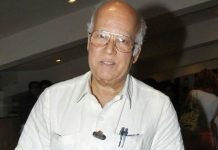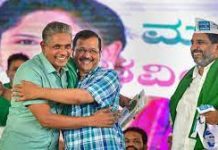 Helming this change is Rishi Kapoor, along with Amitabh Bachchan who has been enjoying the most interesting and engaging parts of his career. But it is Rishi Kapoor’s current career path that makes for the most visibly progressive story of change in Hindi cinema.
Helming this change is Rishi Kapoor, along with Amitabh Bachchan who has been enjoying the most interesting and engaging parts of his career. But it is Rishi Kapoor’s current career path that makes for the most visibly progressive story of change in Hindi cinema.
Rishi Kapoor will play a Muslim father whose son reportedly has links with Islamic terror in Mulk. When his son comes under scrutiny, the father, a law-abiding citizen and his family, face social estrangement, humiliation and have to fight a court battle to prove that they are not collectively engaged in acts of terror. The film co-stars Taapsee Pannu, a promising young star and Prateik Babbar. The lead role belongs to the sixty plus yesteryears star, as this statement film by Anubhav Sinha counts entirely on the strength of his performance to pull through a tough and potentially controversial look at social prejudices.
Kapoor seems to be flourishing at a time when most retire from acting. Roles worth his time and characters that challenge him as a performer have gradually begun to emerge since the past decade, making him visible to the present generation of moviegoers. Earlier this year, Amitabh Bachchan and Rishi Kapoor starred together in 102 Not Out a super hit film that tackles the relevant social issue of poor treatment of ageing parents. Per se, the film isn’t artfully made and has clichés. But riding on the sheer performance of two of our best actors, this one touched a chord with audiences, bringing huge word of mouth revenues and staying on in theatres. Made on a low cost of under 11 crores, 102 Not Out went on to make more than 75 crores. Kapoor and Bachchan brought alive the sentiments and experiences that young stars can only imagine; such is their range and versatility.
Speaking to the media, Kapoor recalled that each time around when he works with Amitabh Bachchan, he learns something new. “We’ve played brothers, friends in the past in many successful films… This time, he plays my father. We are both disciplined professionals, and each time, since I consider myself a student of cinema, I learn something new from Mr Bachchan. This time around I learnt how easily and flawlessly he gets in character for a part.”
Kapoor’s comment is pleasantly surprising for it is well known to insiders and experienced journalists that both these movie stars never did get along. Amitabh Bachchan’s angry young man persona was so overwhelming in the seventies, that Rishi Kapoor would
always have to play the part of a second lead. Despite great potential for intensity and emotion, he was relegated to playing a romantic hero. Bachchan is the one that writers wrote a part for; Kapoor just came along to join in ensemble casts. Which is why, in his biography, Khullam Khulla, Kapoor has mentioned that while Bachchan has often acknowledged the contribution of writers and directors in his meteoric rise and consistency as superstar, he has never spoken about the part that other co-actors, like Kapoor himself, have played in enhancing his films. A tone of bitterness is hard to miss in that statement.
That Rishi Kapoor feels left out from the race to the top in the peak of his career is obvious. Despite his debut as leading man in Bobby (he made his film debut as a young boy in Mera Naam Joker), a love story that broke all records and became the legend, Kapoor rarely got a chance to go beyond the mushy romantic hero. As he often states in interviews, filmmakers like Hrishikesh Mukherjee and Shakti Samanta never cast him or even thought of him for meatier character parts. Instead, he would wear sweaters and serenade heroines in scenic backdrops in Kashmir, Ooty or Switzerland. Whenever he did get a chance to flex his acting prowess, he displayed a controlled performer way ahead of his time. In films like Karz, Ek Chadar Maili Si, Barood, Doosra Aadmi, Prem Rog and Damini, he tackled grey characters and progressive men with panache. Unfortunately, not many of these films did well.
It’s filmmakers that turned Thirtyish around the late Nineties that spotted the latent talent in Rishi Kapoor to bring heft and value to key characters. As he often fondly recalls, Zoya Akhtar wrote the part of Romy Rolly, a typical Bollywood producer with poor wardrobe tastes in her debut, Luck By Chance. He made the character his own. The film flopped but opportunities for this veteran star suddenly opened up. His hunger to play characters also inspired Rishi Kapoor to take up roles across a wide spectrum.
So he played an octogenarian keen to unite his family, and open to cracking a few dirty jokes with his grandsons in Kapoor & Sons; took up the role of a human trafficker with a strong personal code of morality in Agneepath; and the avuncular mentor to lost lovers in Love Aaj Kal and Shuddh Desi Romance respectively. In each of these films, he brought a touch of authenticity and credibility. His performances brought alive otherwise flat characters, making these films more convincing. He has had his share of forgettable parts too, but the monies that he makes today prove to be a strong motivation. When he has played negative characters in D-Day and Aurangzeb, he has done those parts with flair.
Amitabh Bachchan returned to acting with a vengeance after bankruptcy in 2000 nearly forced him to sell his house. His return to cinema opened up a gamut of possibility for filmmakers and writers to imagine, create and build solid ageing characters. As Rishi Kapoor often acknowledges, he led the way. Kapoor, with his signature acting style, has added depth to this evolution. Now with Anil Kapoor playing significant lead roles in Fanney Khan and Ek Ladki Ko Dekha To Aisa Laga at 61, the space for the veteran movie star has been carved out. Audiences continue to enjoy watching them in action and they bring value to parts based on instinct alone. They belong to an era when a bound script and character graph were almost non-existent. Now, when writers adopt an organised approach, and films draw from reality to get audiences there is potential for some truly great movies with Rishi Kapoor and his contemporaries leading from the front. More power to them!
letters@tehelka.com













